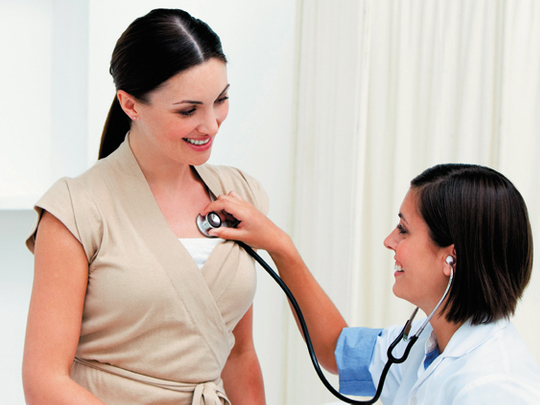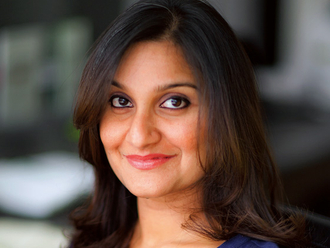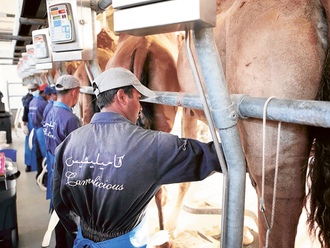
More women die of heart disease than men in the US and the statistics keep rising alongside other diseases such as hypertension and diabetes.
Women, it would seem, are so preoccupied with their families and professional lives that they have put their health on the back-burner. However, the importance of regular health check-ups cannot be overemphasised, says Dr Jaimala Shukla, a gynaecologist and obstetrician at the Emirates Diagnostic Centre in Dubai. Women need to be more conscientious when it comes to having annual medical check-ups.
Over the last decade there has been an increased awareness among women in the UAE to undergo comprehensive health check ups, says Dr Shukla. Keeping this in mind, several hospitals and health care centres have put together a range of medical packages - tailored specifically for women - that include a comprehensive range of what should be mandatory tests. Adopting an attitude of intervention would undoubtedly see a positive change for women's health worldwide. In fact, regular check-ups could save life, say experts.
Do you need a comprehensive health check-up?
"These days, most hospitals and medical clinics offer women's wellness health packages," says Dr Shukla. "These involve a comprehensive exam and check-up in one go. The patient is screened for problems that may not have yet been diagnosed. The doctor will also educate the patients about the prevention and treatment of diseases."
Many of these tests are preventive by nature. "Your blood pressure, cholesterol and sugar levels will be checked; a breast examination for cancer and screening tests for cervical cancer, colon cancer and osteoporosis will also be done. Specialised tests will be done according to the patient's medical history. The family history will also be considered," she says.
Heart disease, thyroid problems and other hormone-related health conditions, kidney malfunctions and depression are among the most common medical conditions for women. A pregnancy can be affected if these conditions are not diagnosed and treated.
When should you start health screenings
"Women should start going for screenings from the age of 20," says Dr Shukla. "I would recommend different tests and screenings according to the individual patient's age and medical history," she says.
Her advice is: between the ages of 20 and 30, a clinical breast examination, pap smear, pelvic examination and blood pressure reading is mandatory. After 30, a diabetes test should be done annually. After 40, a clinical breast examination, a mammogram, a pelvic exam, an ultrasound examination and a pap smear should all be done once a year. Blood cholesterol and sugar levels should be checked, and a blood count and kidney function test should also be included. These tests are done annually or earlier as recommended by health care professionals.
After 50, a colon cancer screening must be done once a year and a bone mineral density test every three years. After 60, all the above tests should be carried out.
Women are also advised to enquire about preventive vaccines regardless of their age. These include the vaccine against the Human Papillomavirus (HPV) to prevent cervical cancer, flu jabs and a pneumonia shot for older women.
What does a consultation involve?
A patient is registered and her vitals (pulse, blood pressure, height, weight, temperature and oxygen saturation) are checked," says Dr Shukla. "A thorough history is documented including past and present health problems, family history, any medications being taken, as well as a note of allergies, if any. Her menstrual and obstetric history is also noted.
"She is then briefed about the check-up and tests required. After the tests, the patient is advised as to what medication, if required, is necessary.
"At this stage, the patient is also advised regarding the age-related screening tests, vaccinations, importance of daily exercise and healthy eating habits. The patient will also be taught how to carry out a self- examination to check for breast lumps; brochures are provided to help with this. Patients who wish to start a family are asked to undergo special screening tests and are started on folic acid tablets. They are encouraged to quit smoking and to focus on eating well and doing regular exercise."
The tests
There are various tests that may have to be conducted. "These include mammograms, pap smear test, colon cancer screening (colonoscopy) and a bone mineral density test for osteoporosis," explains Dr Shukla. "Some patients may also require additional tests such as an ECG, lung function tests, a stress test and an echocardiography.
"Cholesterol tests are generally done on those who are older than 40, but if the patient is younger and has diabetes, high blood pressure or has a history of heart disease in their family, cholesterol tests should be done regularly."
How young is too young?
Dr Shukla stresses the need for young girls to go for screenings in their pre-teen years. "They are advised to start the cervical cancer vaccine programme, as well as vaccinations against rubella (for German measles) as soon as possible. It also helps to teach them healthy habits from an early age. Preteens and teens should also be screened for anaemia," she says.
Dr Shukla is unhappy about the fact that the majority of women are not keen on visiting doctors who specialise in feminine health. "There is a lot of ignorance surrounding this" she says.
"[The examination] is a simple, painless procedure during which the doctor takes a small swab from the cervix to obtain cells for the test. These cells are sent to a histopathologist and the results are usually obtained within a week.
"Many women are paranoid when it comes to having a check-up," she says. "The general lack of knowledge regarding procedures as well as a fear of pain - often stemming from bad experiences - are common reasons for women to avoid a gynaecological examination. Being sensitive to a patient's problems is vital. The doctor must earn this trust so that the patient can feel she may talk freely. If the patient is not comfortable having an exam during her first visit, a later appointment should be scheduled."
Top women's issues
"The top five include menstrual problems, inability to conceive, infections, breast lumps and general concerns regarding pregnancy. Also, many women suffer from incontinence yet do not talk about it," she says. "They find this particularly embarrassing. Many women are afraid to venture far from their homes for this reason. However, women should be encouraged to discuss it with a medical practitioner as in most cases, incontinence is treatable.
"I am equally concerned about the increase in the number of women with heart conditions. An increase in obesity, lack of physical activity and eating a high sugar, high refined diet has led to an increase in heart disease. Maintaining a balanced diet and an active lifestyle is crucial. Those who have a family history of heart disease, hypertension and diabetes should be particularly attentive and should start an early screening programme."
Dr Shukla says that there is also very little awareness surrounding Polycystic Ovary Syndrome (PCOS). "PCOS is a very common problem among women," she says.
"It is has a high incidence in the region. At least 60 per cent of patients who complain of irregular periods, an inability to conceive and unusual weight gain have PCOS. By definition, it is a hormonal disorder characterised by an accumulation of small follicles in the ovaries. The exact cause is not known although it has been linked to incidents where the BMI (Body Mass Index) is above normal and is more prevalent in families where there is a history of diabetes. Eating processed food could be a contributing factor. A healthy diet should be maintained."
Remember the mandatory
- Mammogram
"A low-dose of radiation is emitted by a specially designed machine, capturing images of the inner breast tissue. The breasts are compressed for a few seconds between X-ray plates. The examination is not painful although some patients may feel slightly uncomfortable.
"The information obtained is invaluable. To date mammograms are the most cost effective method of diagnosing breast cancer early," says Dr Shukla.
- Breast ultrasound"This test identifies cysts and tumours within the breast," she says. "It involves no radiation. It is usually combined with a mammogram to localise lesions."
- Pelvic ultrasound"This is a non-invasive test to detect pelvic cysts and masses. It is a quick and accurate way of looking at the pelvic organs, especially the ovaries and the uterus.
Know your health insurance
That are not many insurance companies that cover these packages. "Most companies only offer basic coverage. It is important to know exactly what your insurance covers. The good news is that most of the insurance packages can be upgraded to meet your needs," says Dr Shukla.
Know your history
High blood pressure
Suggested tests: Blood glucose, urine examination, cholesterol level tests and an ECG at regular intervals. Blood pressure monitoring is done either by the doctor or can be done by the patient, thus reducing clinic visits.
High blood sugar
Suggested tests: Blood pressure, urine, vision and cholesterol tests. Influenza and pneumococcal vaccines also need to be given. Blood sugar tests must be repeated. Patients are taught how to monitor blood glucose levels.
History of cancer in the family
Suggested tests: Mammograms, Pap smear and screening tests for ovarian and colorectal cancers. The HPV (Human Papillomavirus) vaccine must be given.
History of heart patients in the family
Suggested tests: Blood pressure tests, cholesterol test and blood glucose tests. ECG and echocardiography are done at regular intervals. Influenza and pneumococcal vaccines need to be given. The patient is taught to recognise the early signs of an ischemic attack.
Health packages for women
There are quite a few clinics in the UAE which offer health packages for women. The number and kinds of tests vary depending on the package and the hospital/clinic. Here is a list of a few centres offering wellness:
HealthPlus Women's Health Centre in Abu Dhabi offers:
- HealthPlus Female Health Package (recommended for women below 40 years every three years) - Dh2,000
- HealthPlus Mature Woman Health Package (recommended for women above 40 years every year) -Dh3,000
- HealthPlus Early Adolescence Package (for Girls from Puberty until age 21) - Dh1,000
- HealthPlus Early Pregnancy Package (from four weeks to 12 weeks), Dh2,500. For details regarding the various packages go to www.hplus.ae
RAK Hospital, Ras Al Khaimah offers:
- Well Women Check - Dh750
- Whole Body Check for Women - Dh2,800.
For details, go to www.rakhospital.com
Belhoul Speciality Hospital, Dubai, offers:
- Well Women Check (With Mammography) - Dh1,000
Well Women Check (Without Mammography)- Dh750. For details, go to www.belhoulspeciality.com
Welcare Hospital, The City Hospital and Emirates Diagnostic Clinic
- Well Woman Screening (recommended for women below age 40). Priced at Dh1,980 at Welcare Hospital and The City Hospital and Dh1,331 at Emirates Diagnostic Clinic
- Well Woman Health Review (recommended for women above the age of 40). The package is priced at Dh4,180 at Welcare Hospital and The City Hospital; Dh2,888 at Emirates Diagnostic Clinic. For details, go to www.ehl.ae











